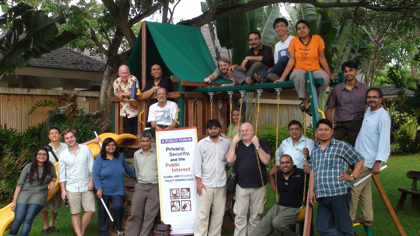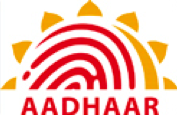The UIDAI publishes figures on how many characters are getting added to its database daily, and one of my less technologically challenged friends has worked out how to review those figures (on Twitter: @uidstatus). It makes for interesting reading, watching how many times that ‘mission-critical’ database link goes down, how days go by when it adds nobody (not counting fake IDs, about which the agency hasn’t a clue, apparently, putting it on par with all the other clueless adnumbering exercises that have plagued this country for years), and even the days the actual count goes down, as though people are vanishing like smoke.
Numbers with Meaning
Filed under Communication, Community, Democracy, development, governance, Privacy, Security, Self-help, UID
Belling the Cat
A random pick of three news items, each of which discusses the public availability of free wireless connectivity in mass transit systems. In London and New York, the service provider is a third-party private, for-profit, agency, while it is not mentioned in the article on northern Ireland, but seems to be the transit company itself.
Now, as many people would know, wifi is not currently the most protected and secure wireless connectivity option possible, but nearly all modern portable devices can connect to it ‘out of the box’. Continue reading
Filed under Accessibility, Communication, Community, connectivity, Democracy, development, Radio, Self-help, Wi-Fi
Don’t Worry – Be Hapee
The other day, on a list to which I subscribe, I found this light-hearted observation about a very serious subject – hape.
Hape is not, as the Quick Reader may imagine, the last of the items (the others, like hape, were also evil) to emerge from Pandora’s box, in the Greek myth.
All round the world, business content and business processes are being digitised and made available to stakeholders, often in a highly restricted manner, ie on some kind of subscription basis. Subscribers do so, often paying money, in the faith that they get, in return, some sort of exclusive or protected access.
Quite often, in order to do so, they also voluntarily make available some kind of personal information (it varies, of course, depending on the need). Continue reading
Filed under Communication, Community, connectivity, Democracy, development, Education, governance, Holistic, Internet, Privacy, Security, Smart Cash, social processes, technology, UID
Privacy is a public concern
March began interestingly for me this year, with two big meetings back-to-back, in Panglao, a tiny island in the Philippines. The first was with Privacy International, the London-based public service  organisation. It has worked tirelessly for over two decades to keep public awareness of personal privacy rights.
organisation. It has worked tirelessly for over two decades to keep public awareness of personal privacy rights.
Surprisingly, for most people who hardly ever need to think twice about such an obvious attribute of free people, this right is fast vanishing around the world, and most dismayingly, in democratic countries. Continue reading
Filed under Accessibility, Blogroll, broadband, Broadcast, Communication, Community, connectivity, Democracy, development, Education, energy, governance, Holistic, Internet, Media, Privacy, Security, social processes, technology, UID
Rules and Misrules
At the very tag-end of 2008, an extraordinary event took place. India’s Parliament met for a stormy Winter Session, during which little of note was discussed, and little value was added to the fabric of society. And then, as the Session was drawing to a close, a number of Bills were brought up for voting, and within a few minutes, with little or no words exchanged, they were passed in toto.
The utter disregard of the country and its people implicit in this kind of facile performance is stunning and salutary, especially in light of the public agitation that has spread across northern Africa and parts of Asia, with citizens of many countries taking to the streets to express their disgust at the way that they have been taken for granted, by governments and leaders that claim to have their best interests at heart. Some of the perpetrators of such callousness now find themselves scrabbling to escape, together with untold amounts of wealth stolen from their hapless countries.
That the Indian public has so far been a little more forgiving of such small degradations is a current feature, not a guarantee.
Today, February 28, 2011, I am trying to be equally forgiving. Continue reading
Filed under Accessibility, broadband, Communication, Community, connectivity, Democracy, development, Education, governance, Internet, Media, Privacy, Security, social processes, technology, UID
Studying the Foundation
The UIDAI project is arguably one of the biggest initiatives, in both scope and cost, undertaken in independent India, without any of the expected norms of prudence (oversight) and democratic consensus. Variously estimated to cost anywhere between Rs 40,000 and Rs 150,000 cr (INR), which is roughly equivalent to about USD 1 bn to USD 15bn, it has been kicked off with a Cabinet-sanctioned budget of Rs 1,900 cr (ie about USD 50mn) this fiscal (Apr10-Mar11). The budget is believed to be somewhat of a smokescreen, as it does not appear to include moneys taken from other agencies. However, the lack of clarity about money is not the only issue, as the project has been cleverly positioned within the Planning Commission, an arm’s-length agency charged with perspective planning for the country, which is independent of the usual line of command. As a result, the project has neither Parliamentary sanction nor even a (temporary) Ordinance.
The UID project is in many ways a global watershed, expecting to assign a unique number to every resident of the country, well over 1.2 bn people, a staggering concept, the scale of which has itself been used to justify taking on the project (by equating the immensity of the challenge to its worth). Considering my association with Privacy International, my concern is well-founded on grounds of potential destruction of personal privacy, but this is a very difficult viewpoint to defend in India, which does not have a specific privacy law, and for which the existing Constitutional protections (alluded to, not spelt out) have not always been strongly defended by Indian courts.
An international project, studying Privacy in Asia, seeks to ameliorate this situation, by getting to grips with comprehending Indian attitudes (ie, within the ambit of Asian attitudes). However, given that the UID project is gathering steam and proceeding willy-nilly, it is imperative to make every effort to bring it to a halt, at least a temporary halt, until sufficient information is available. Continue reading
Filed under Accessibility, Communication, Community, connectivity, Democracy, development, governance, Privacy, Security, social processes, technology, UID
At the Foundation – talking with people
It was a dark and stormy night, and ….
No wait, that’s not quite right. It was 2 o’clock in the afternoon, actually.
However, it was certainly dark and stormy, Mumbai’s wettest day this monsoon, with 16 measured cm of rain, most of which seemed to be pelting down my collar as I arrived at the ![]() Moneylife Foundation’s Shivaji Park offices on 17th August 2010.
Moneylife Foundation’s Shivaji Park offices on 17th August 2010.
I went there to interact with people who wanted to learn more about Aadhaar, India’s multi-billion dollar IT project , that promises to assign unique identity numbers for each resident of India. Keen readers of this blog will have doubtless noted that it was the subject of the previous blogpost too.
, that promises to assign unique identity numbers for each resident of India. Keen readers of this blog will have doubtless noted that it was the subject of the previous blogpost too.
Filed under Democracy, development, governance, Privacy, social processes, technology
Without Foundation
Aadhaar, ‘the foundation’ (loosely translated) is a gigantic project, that will assign unique numbers to all people in India, to serve as a single reference point to firmly establish their identity. UIDAI, the Unique Identity Authority of India, has been set up, ad interim, as a department of the Planning Commission of India to steward this project.

A friend of mine, Ram Krishnaswamy, has tracked well over 400 articles extolling the merits of the project, and gathered them at the blog “Aadhararticles.blogspot.com”. Specific references are linked in this blogpost.
Rather than reassure, however, they raise questions in the mind about the worth of the project. Ram and I decided to work together to compile some key questions. A detailed version of our study has been published in print, in MoneyLife, the magazine brought out by crusading journalists Sucheta Dalal and Debashis Basu, here and here. This blogpost reflects that article (which is part of an ongoing series). It also reflects some additional information about Q2 below received after it was originally written, and is updated as of Friday, 20 August, 2010.
Filed under Democracy, development, governance, Privacy, social processes, technology
Doing less with more, or, fossil fools
I know. That could be about just about anything we humans do with the natural resources at our disposal – except manage the residue, it seems.
But this post is about spectrum usage, and energy. Odd combination. Eager readers of my tireless prose might wonder, since I have already posted here about alternate energy conversion routes, and about spectrum, at length (friends assure me it is entirely too much length, in fact. As Garth Brooks put it, I’ve got friends. On the other hand, maybe I don’t have a lot of readers).
Filed under Accessibility, Blogroll, broadband, Communication, Community, development, energy, Fossil Fuels, Radio, social processes, Wind Power
Size matters
Not long ago, the nation of India decided it was mature enough to allow people to communicate with each other, even poor people (of which there are, as it happens, still a few). Not just talking, which is more or less a habit, but using high quality electronic telecommunications, of which the very cheapest is FM (frequency modulated radio broadcasting, using the medium wave band). Continue reading
Filed under Accessibility, Broadcast, Communication, Community, Democracy, development, Media, Narrowcast, Radio, Security, Self-help
